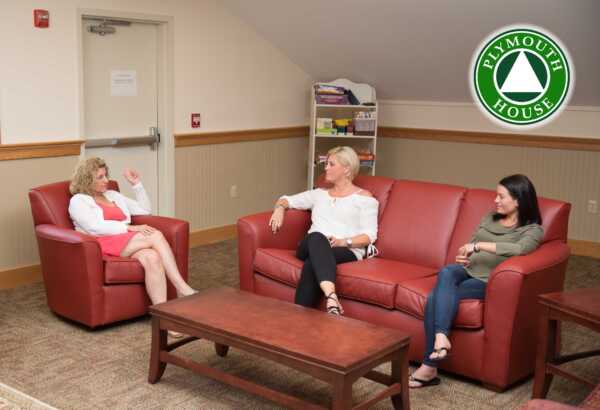Help Your Loved One
The Plymouth House’s Intervention Services
Are you considering staging an intervention for your addicted loved one? We know how painful it is to watch someone you love disappear before your eyes, taken over by their addiction. We know how scary it can be to confront your loved one about their habits. We are here to help.
The Plymouth House’s expert interventionist will help you speak to your loved one, communicate your fears and hopefully persuade your loved one to seek treatment at The Plymouth House.
Watching Someone’s Addiction
Addiction is a complex problem. It is a problem that often includes denial and defensiveness — one that leads to little more than cyclical self-destruction and an inability to care for oneself at the most basic human level. If you have ever watched a loved one struggle with addiction, you know just how painful it can be. You probably feel as if you have tried everything to help push them in the direction of recovery; bargaining, giving ultimatums, setting boundaries and literally begging on hands and knees. Still, if your loved one is deep in the trenches of addiction he or she might adamantly refuse the help that is so clearly needed. This is where a professionally staged intervention comes into play. At the Plymouth House we work closely with several highly experienced and extensively trained interventionists, all who boast very high success rates. If you have a loved one who is in need of professional help yet continually refuses it, we are available to help.
We Are Here For You
Let Us Help You Heal
Our Drug & Alcohol recovery services are second to none.
Learn how we can help by speaking with one of our Treatment Advisors today.
What is an Intervention?
What exactly is an intervention? Most people only know what they see portrayed by mainstream media — a circle of sobbing friends and family members telling their loved one how much his or her addiction has impacted them, and begging them to go to rehab. While this isn’t a total misrepresentation, there is much more that goes into the process. Essentially, a professionally staged intervention is an event that occurs with one main goal in mind. Most often that goal is to persuade a person to enter into a program of addiction recovery (often medical detox followed by residential inpatient treatment). Interventions take place in a controlled environment, and in order to be effective they must be orchestrated by an experienced professional. Although you might feel that holding an intervention on your own is better than nothing, the truth is that without professional guidance your efforts are likely to backfire, and you might unintentionally do more harm than good.
When is an Intervention Necessary?
While an intervention could be beneficial in many scenarios, if you or your family meet the following criteria, then it is critical you get the help of an interventionist. If you want to speak to us more about your situation, contact us 24/7.

Reasons to Stage an Intervention
- The life of your loved one is in immediate danger – In most cases this is because the substance abuse disorder has become especially severe. Maybe your loved one has experienced one or several drug-related overdoses, or maybe he or she has been warned by a medical professional that unless he or she maintains complete abstinence, it could result in life-threatening physical consequences.
- Your loved one continuously puts the lives of others in danger – Maybe he or she resorts to violence when intoxicated, and these violent reactions have been steadily escalating. Maybe your loved one repeatedly gets behind the wheel of a car while intoxicated, or engages in other dangerous activities that could easily turn fatal. A good rule of thumb is that if your loved one is an immediate danger to themselves or to others, an intervention is likely necessary.
- Your loved one is struggling with an underlying mental health condition that renders them incapable of making rational decisions – In some cases, a person might be grappling with an untreated mental illness while actively abusing substances. This can be a dangerous combination, seeing as the symptoms of one disorder will inevitably exacerbate and worsen the symptoms of the other.
- You have attempted to set and maintain personal boundaries with your loved one, but you lack the support you need to stick to your guns – In some cases, you simply need the support and guidance of a trusted professional. Helping a loved one overcome addiction is a complicated process, and it is not one that you can do without serious backup.
If you are ready to help your loved one overcome his or her substance abuse disorder and go on to lead the happy and fulfilling life he or she undeniably deserves, contact us today.
Ready To Begin Your Drug & Alcohol Treatment?
We Offer A Safe & Effective Program
Don’t let Drug & Alcohol addiction control your life.
Call us today and let’s get you started on the path to a better you.
The Intervention Process from Start to Finish
What does a typical intervention look like? Most professionally staged interventions follow the same basic outlines. At the Plymouth House all of the interventionists we work with follow the below steps when organizing the event.
Here are the steps for hosting an intervention:
Step One: Contact us at The Plymouth House
Once you explain your current circumstances, we put you on the phone with one of our intervention advisors. The advisor will make sure that an intervention is the best course of action before putting you into touch with one of our interventionists.
Step Two: Speak with one of our professional interventionists
Once we put you in touch with an interventionist, he or she will begin helping you develop a plan of action. It is important that the interventionist knows the details of each individual case as thoroughly as possible. In order to do so, he or she will ask you a series of pertinent questions. As soon as all pertinent information is gathered, then an intervention team is formed.
Step Three: Form your intervention team
This team consists of the people who are going to be present at the actual event. It is important that discretion is used. You might want to avoid inviting coworkers, classmates or second cousins, for example. Keep it small and intimate. Make sure that the intervention team is made up of very close friends and family members who have been directly impacted by the addiction, and who are in the presence of the individual in question on a regular basis.
Step Four: Set boundaries
Once the intervention team is formed, specific boundaries must be decided upon. In many cases this means letting your loved one know that if he or she decides to continue using and refuses the treatment that is offered, he or she will be cut off financially or will no longer be welcome to stay in your home. Boundaries could also include cutting off contact until he or she seeks help. As harsh as this might seem, it often proves effective. During this stage of the process, the interventionist will also help you decide on a specific rehab center.
Step Five: Pick a treatment plan
It is very important to have a treatment option ready and available for your loved one if they accept help. It is best if the individual is admitted into a medical detox or treatment center on the same day as the intervention.
Step Six: Writing letters
It is advised that each member of the intervention team write a letter to be read aloud on the day of the intervention. These notes focus on personal feelings and the way the addiction has impacted each participant. It is crucial that placing blame is avoided. The interventionist can help you determine what you want to say, and what would be useful to say. The last step, of course, is the intervention itself.
Step Seven: The Intervention
On the day of the intervention, the professional interventionist will lead the way. It can be an emotional day, but professional interventionists know how to carefully guide the conversation and process to hopefully arrive at a good outcome.
Begin Healing Now!
Have A Call With One Of Our Treatment Advisors
Don’t Suffer Any Longer
Help Your Loved One Overcome Addiction
We are a 12-Step Retreat focused on giving addicts, alcoholics and their families a new way to live. Our staff consists of experienced 12-Step practitioners with diverse educational backgrounds and life experiences. Dozens of facilities have adopted The Plymouth House Model, but the depth of our staff experience, our family programming and our aftercare planning make us unique. For two decades we’ve been a pioneer in utilizing the power of The 12 Steps to give addicts, alcoholics and their families hope and healing. If you or your loved one are ready to start the personal journey of recovery, contact us today. Our experienced team of Treatment Advisors will personally work with you and your loved one from your first contact with us until the day you arrive at The Plymouth House. We know that in most cases our guests and their families have a myriad of questions regarding available treatment options, coverage options, our facilities and the finer details of the admissions process. With one phone call we will assist families and individuals in making the right choices for their unique situation.
















